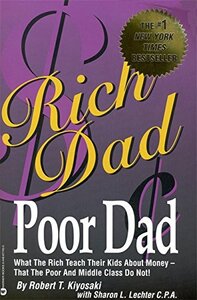Take a photo of a barcode or cover
2.05k reviews for:
Rich Dad, Poor Dad: What the Rich Teach Their Kids about Money – That the Poor and Middle Class Do Not!
Robert T. Kiyosaki
2.05k reviews for:
Rich Dad, Poor Dad: What the Rich Teach Their Kids about Money – That the Poor and Middle Class Do Not!
Robert T. Kiyosaki
It's a pump-up book that I would generally recommend to those looking for inspiration to spur change in their lives, but not as a legitimate guide. Nothing feels phony- I believe that the author believes everything he is writing, but some of it misses the mark. I most strongly agree that financial literacy, over a life time, is usually the only difference between lower-middle and upper-middle class. However, grouping poor people into that mix is more difficult as the factors surrounding their lack of prosperity go a lot deeper than money management.
The way the points are constructed into a story, which may seem contrived at first, is commendable. Some of the advice is not just disputable, though. It is wrong. Other advice, while not objectively wrong, caused me to raise my eyebrows. Specifically, "trading" stock and real estate in the short term, and holding homes for "on average 7 years" is not something anyone should do. Further, while stock brokers don't exist any more, a novice might come away from this book believing that investment professionals can help them find undervalued investments. This can be countered by a common adage- if an investment is so good and success is certain why not leverage to the gills and put all your money into it? Why would a stock broker tell a puny commercial client about it? Right, because he makes a commission and has no vested interest in how the stock will perform.
The author also suggests you get involved with multi-level marketing companies, also known as ponzi schemes. The few sentences dedicated to this topic are enough to kill the author's credibility in the year 2016. Hopefully its been removed from editions newer than the one I read.
Several times, extremely lucrative investment opportunities are mentioned. Along the lines of "turn $5,000 into $1,000,000 or more by being a sophisticated investor!" or "Be one of the 4% people who can turn $10,000 int $20,000 or more in just a year (by taking risks!) ". This advice should not be taken literally, though the author means for it to be taken literally. How can we get through the whole book without talking about the pitfalls of having money such as falling for get rich quick schemes? Because it would be antithetical to the methods for achieving prosperity that the author recommends.
The author is proud of having paid off a Porsche in cash. My question is, when you apparently own tax liens paying in upwards of 16%, why would you commit at least $30,000 to a depreciating asset when you could finance it and earn more money from that $30,000? If you consider yourself a more sophisticated investor, there isn't much for you here. There isn't enough focus on the value of debt and leverage and the difference between interest rates.
An entertaining, informational read that falls short of what it could be.
Visit my blog for this and other book reviews
The way the points are constructed into a story, which may seem contrived at first, is commendable. Some of the advice is not just disputable, though. It is wrong. Other advice, while not objectively wrong, caused me to raise my eyebrows. Specifically, "trading" stock and real estate in the short term, and holding homes for "on average 7 years" is not something anyone should do. Further, while stock brokers don't exist any more, a novice might come away from this book believing that investment professionals can help them find undervalued investments. This can be countered by a common adage- if an investment is so good and success is certain why not leverage to the gills and put all your money into it? Why would a stock broker tell a puny commercial client about it? Right, because he makes a commission and has no vested interest in how the stock will perform.
The author also suggests you get involved with multi-level marketing companies, also known as ponzi schemes. The few sentences dedicated to this topic are enough to kill the author's credibility in the year 2016. Hopefully its been removed from editions newer than the one I read.
Several times, extremely lucrative investment opportunities are mentioned. Along the lines of "turn $5,000 into $1,000,000 or more by being a sophisticated investor!" or "Be one of the 4% people who can turn $10,000 int $20,000 or more in just a year (by taking risks!) ". This advice should not be taken literally, though the author means for it to be taken literally. How can we get through the whole book without talking about the pitfalls of having money such as falling for get rich quick schemes? Because it would be antithetical to the methods for achieving prosperity that the author recommends.
The author is proud of having paid off a Porsche in cash. My question is, when you apparently own tax liens paying in upwards of 16%, why would you commit at least $30,000 to a depreciating asset when you could finance it and earn more money from that $30,000? If you consider yourself a more sophisticated investor, there isn't much for you here. There isn't enough focus on the value of debt and leverage and the difference between interest rates.
An entertaining, informational read that falls short of what it could be.
Visit my blog for this and other book reviews
informative
slow-paced
It wasn’t super engaging and started to feel repetitive and braggy after a while.
Very good book on how to visualize the idea of money and how it can work for you.
challenging
informative
inspiring
fast-paced
Great Motivation Book to start Finanz
This might be an unpopular opinion, but the book contains very basic knowledge of finance that is known to everyone these days. So basically if you are below 18 and doesn’t know anything about finance it’s a good book for you, but otherwise, it’s not. For fresher in the finance industry this is a good book but otherwise it doesn’t have any in-depth knowledge, rather you should prefer reading psychology of money.
challenging
inspiring
medium-paced




